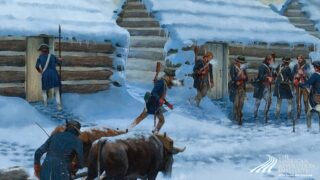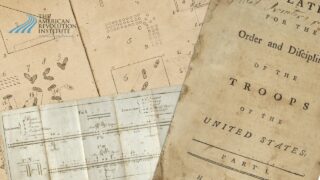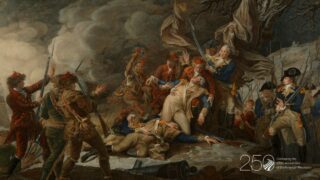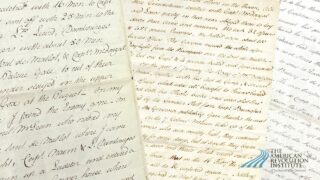Supporting scholarship and promoting popular understanding of the American Revolution is central to the work of the American Revolution Institute. The Institute welcomes distinguished scholars and authors to share their insights and discuss their latest research with the public at Anderson House through lectures, author's talks and panel discussions. The Institute also hosts a variety of other historical programs throughout the year, including our Lunch Bite object talks, battlefield tours, special Anderson House tour programs and other events. Many of the events we offer are free.

November 2025
Panel Discussion—The Archaeology of the American Revolution
Richard Veit, Ph.D., professor of anthropology at Monmouth University, moderates a panel of contributors to a new anthology that offers new interpretations of the Revolutionary War, The Archaeology of the American Revolution. Drawing from select works within the volume, panelists will connect historical narratives with material culture, explore how cutting-edge archaeological methods and technology have illuminated previously undiscovered sites, and examine how material remnants and memorials shape the ways the war is remembered. Registration is requested. To attend the author’s…
Find out more »From The Vault—Military Training in the 18th Century
Join library staff, along with historian Steven Elliot, Ph.D., for a special program exploring selections from our library collections relating to military training during the American Revolution and the long eighteenth century. This special viewing will allow guests to explore rare items—including military treatises, orderly books and training manuals—up close while learning about the various tactics and practices used to train soldiers in eighteenth-century armies. This program will be held in-person only. Registration is limited and will be honored on…
Find out more »December 2025
Battlefield Tour—Revolutionary Charleston
Join us in Charleston, S.C., as we explore two important events of the American Revolution: the Battle of Sullivan’s Island and the Siege of Charleston. This two-day experience will include a Friday evening dinner and lecture at the Carolina Yacht Club given by independent historian Cordell Bragg discussing Gen. William Moultrie and the Battle of Sullivan’s Island, fought on June 28, 1776. The following day, guided tours led by historians Doug MacIntyre and Carl Borick will explore the various locations…
Find out more »Lecture—The Battle for the Fourteenth Colony: America’s War of Liberation in Canada, 1774-1776
To commemorate the 250th anniversary of the American campaign into Canada, historian Mark Anderson examines the American colonies’ efforts to bring Quebec into the Continental confederation and free Canadians from British “tyranny.” Drawing from his research, Anderson offers new insight into the key political and military factors that ultimately doomed America’s first foreign war of liberation and resulted in the Continental Army’s decisive expulsion from Canada on the eve of the Declaration of Independence. This program accompanies our current exhibition,…
Find out more »Virtual Lunch Bite—The Revolution’s First Winter: Loyalist Thomas Ainslie’s Account of the 1775 American Assault of Quebec
The Institute’s library director, Thomas Lannon, discusses the American invasion of Canada during the first winter of the Revolution and the failed attempt to capture Quebec to rally support against Britain and bring Canada into the rebellion as the hoped-for “fourteenth colony.” With unrest spreading in the southern colonies, British leaders worried rebellion might cross into Canada. That fear was justified and Canada figured prominently in the American strategy for an opening campaign in the Revolution. Congress authorized the invasion in…
Find out more »



